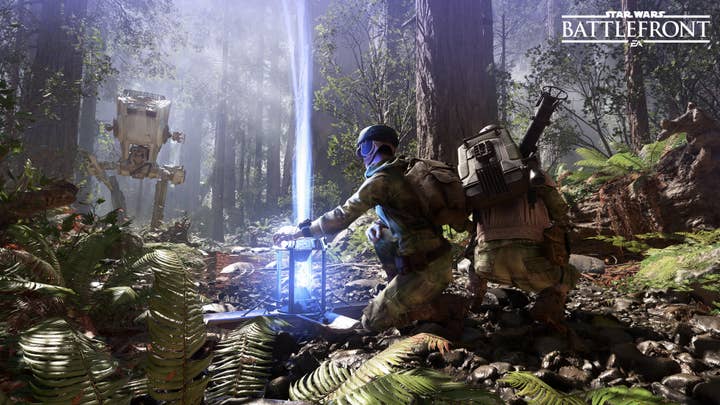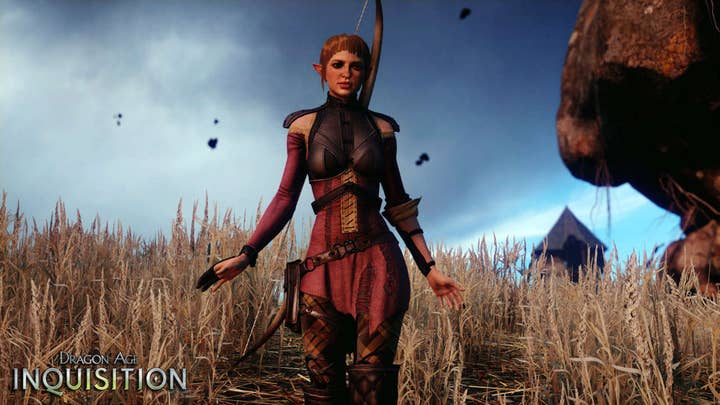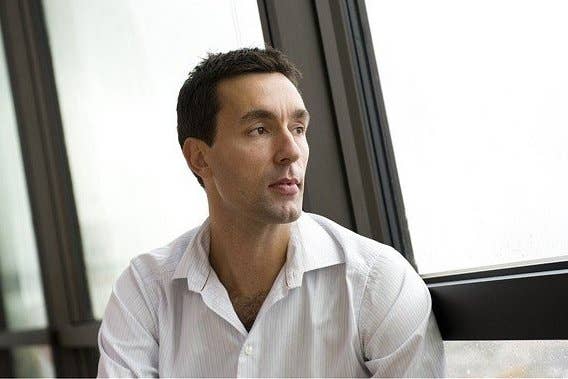Soderlund: EA "can't just be a company that's only about gigantic big things"
The EVP of EA Studios shares his strategies for tech, VR and mobile
Following Electronic Arts' E3 media briefing, where the publisher shined a spotlight on the upcoming Star Wars: Battlefront, a new Need For Speed, new IP Unravel and more, GamesIndustry.biz sat down for a chat with Patrick Söderlund, executive vice president of EA Studios, to get his take on pushing creativity and innovation, how to approach VR, and how the Frostbite engine has become so important to the publisher in this next-gen era.
We've had a lot of discussions inside the studios around our responsibility as Electronic Arts to push the industry forward and to help others. We can't just be a company that's only about gigantic big things. There's more of a portfolio mentality that there's some things that we want to give to the players, that's something like Unravel. We will always put a lot of effort into our AAA games, but it's good for us to have a portfolio that is maybe broader than what we've had in the past.
I think [they] were showing Unravel to a lot of other publishers as well, and I think that we managed to convince them that we would be a good home for this, and that we would nurture it and take care of it the way it deserves. Meeting Martin [Sahlin] and hearing him talk about the game, and how deep it is to him, and how important it is to him, and where it came from, this industry needs that, as well as the other things. A company the size of EA should be in both, I think.
"I'm convinced that VR will have a prominent place in gaming"
I don't do checklists, I can't do that, I'm all about, "Does it feel right, does it look right, does it sound right, does it play well? Okay, let's do it." I'm not about checklists.
I don't believe in designing entertainment or art, to some extent, that way. A painter doesn't go on a checklist, you know, when he or she paints a beautiful painting; a musician doesn't go on a checklist when he or she writes a nice piece. We need to think about it the same way, I think.
What we're trying to do is to get people to work on something that they love, and that they want to work on. I've been in situations where people say, "If you force me to make another X, I will leave," but you also get "if I can't work on this for the fourth iteration, I'm leaving." So you have to cater for the individual needs and kind of, as best you can, put people on what they have a passion for, Star Wars: Battlefront is a good example. It was not originally intended to be at DICE, they were working on other things.
We were planning on maybe a couple of other development solutions, and Patrick [Bach], who runs the [DICE] studio just called me up and said, "What are you thinking? We have to make it here; are you crazy?" The sheer passion from the team is the result, is the reason why you see the game out there, looking and feeling the way it does.

I, and the people that work for me in leadership positions, we're enablers, rather than telling people what to do, and we have to make sure that we course correct and having the benefit of being such a big company, move people from studio to studio. We have a lot of people that are moving around the EA ecosystem.
I believe that we have to continuously push innovation and new things in general, and again we have a responsibility against ourselves and against players out there to be pushing this industry forward and to be pushing boundaries and coming up with new things. The VR is a good example. I'm convinced that VR will have a prominent place in gaming.
It's probably going to take a little bit longer than a couple of months before it actually breaks out and becomes the norm, or at least a part of the norm, but you can approach VR in different ways. The approach that we're going to take with VR is we need to purpose-build the experiences, built for VR from the ground up.
I don't believe in just porting a game into VR. You get into problems like motion sickness and things. If you just were to take Need for Speed, OK, put VR in it, we can do that. We've already done that. We have many of our games, we can get it to VR within probably weeks, if we wanted to, but I don't believe in that approach.
We need to look at this as an extension of our medium, as an extension of how you play and experience interactive entertainment, and kind of take that approach and say, "What can we do with this that we can't do with the controller? How do we embrace VR fully and take advantage of what the technology can offer?" That's kind of our approach to VR in general. We have plenty of VR things going, but we need to learn and understand it more before we commit to a product, which I think many people just jump in and do something.
The passion, and the hunger for new things inside the company is gigantic. It's about fostering a culture where complacency is your enemy, and you want to kind of always strive to push forward and to be better and to do different things
That's where something as big and now well known as FIFA Ultimate Team comes from, or so it could be a new game mode that completely changes how you play a game, but I think everything that we need to do is should be in there to kind of make the experience better to some extent.
The minute you start designing and innovating with money in mind, you're ultimately not going to be successful. You need to put the money aside and say, "How do we actually make something that is fundamental, that helps our games, and essentially the people that play them, to have a better and more fun experience?"

I think mobile in general, you need to understand, first and foremost, the device, and how people use the device, and try and understand that there's a difference between six and 60 inches, and that they are different experiences, and that's fine, and allow them to be that.
A lot of people get hung up on monetization and all these things. Yes, they are important, because ultimately we're a business and we need to be making money, but unless you have a great game…
If you look at the games that are very big out there, Madden Mobile is one of ours, Simpsons' another one, but if you look at our competition, Candy Crush and Supercell's Clash of Clans or Hay Day, let's, put aside the fact that they make a lot of money, all of them are good games. I enjoy playing Clash of Clans maybe too much.
We have to design, again, purpose-built for that platform and also we need to be very careful. It's easy for a company of EA's size to say "Okay, our strategy should be just take a license and then apply Hay Day to it, and then that's it. Make a copy of it."
We need to continue pushing what it means to build a game and for it to be fun. It doesn't mean that we can't take inspiration from something like Hay Day or Clash of Clans, but it still needs to be our own. We need to make it our own and make sure that it's something that we've designed purposefully, instead of something that we just copied and put out there.
I think we'll see mobile will continue to grow. It's inevitable. I mean, we'll see significantly better experiences as the machines get more powerful and capable, but we cannot make the mistake of comparing them to a console, because they're not. They're different gaming experiences.
"I think mobile in general, you need to understand, first and foremost, the device"
Without taking any credit, I started the Frostbite initiative 10 years ago [laughs] and it came out of frustration, having to build an engine every time in every game. I just said, "We're spending 50 per cent of our time making an engine. I want to spend 90 per cent of our time making a game," so we said, "Let's build something that can live over time, that is upgradable, that is where a lot of the focus goes against user interface, and tools and pipelines, then add to it as we go on," and it started as an internal engine for DICE, when DICE was still a separate company, and then, obviously, EA purchased DICE.
It was discussed whether we should just mandate everyone to use Frostbite, and I was not in the same position I am today, this was 10 years ago, but I just said, "Listen, that won't work.
The minute you mandate something to creative people - and people don't think that programmers are creative, but trust me, they are very creative they also have the same need to create and to be developing and adding to something, so I said, "Let's just show people what Frostbite can do, and then have it be a voluntary thing, and if they want to adopt it, they can. If they want to use Unreal or something else, let them," and that proved to be the right strategy.
The first ones to utilize it was our Vancouver studio, built Need For Speed on it, and they did it because they wanted to. That was painful, and they learned a lot from that, and we learned a lot from it as well.

We actually had people from PGA Tour, Rory McIlroy PGA Tour Golf, help to finish Dragon Age, which is very weird, but if you think about it, they're building big landscapes as well and they have trees on there, so there was a lot of things that were common, that are common.
PGA Tour uses streaming technology that initially was developed for Dragon Age to create the big world, so there's a lot of commonalities amongst games that people don't recognize. What does Dragon Age have in common with golf? Actually quite a bit, when you start thinking about it from a technical perspective, so that's a huge benefit, that people are trained on the same toolset and can just go around the world and work on whatever they want.
"What does Dragon Age have in common with golf? Actually quite a bit, when you start thinking about it from a technical perspective"
The third thing I would say is, Frostbite is, it's almost like we've kind of taken an in-house open-source mentality; so the Frostbite team will deliver five or six different versions of Frostbite every year, and you, as a game team, get to pick one. Which one you use, for that time, and then, you can choose to integrate new versions of it, but the Frostbite package may not always give you everything you need; like for Dragon Age, as an example, there wasn't a good cinematic tool in Frostbite, because there's a need for them to tell a story.
In a shooter engine, we didn't have that; so they said, "We want to build this. We know how to do this," so they built it, and then what happens is, it gets then pushed back into the main branch, so that all the other teams can use it. That's kind of an open-source mentality that we use, and people want to contribute to the engine, so we may have 300 people, but in essence we have 3,000 people contributing to the code, and it's getting better and better and better.
It's by no means perfect, and the developers out there will tell you this, but I think it's a lot better than what it was 10 years ago, and it's something that, more importantly, people want to use and want to be a part of creating.

